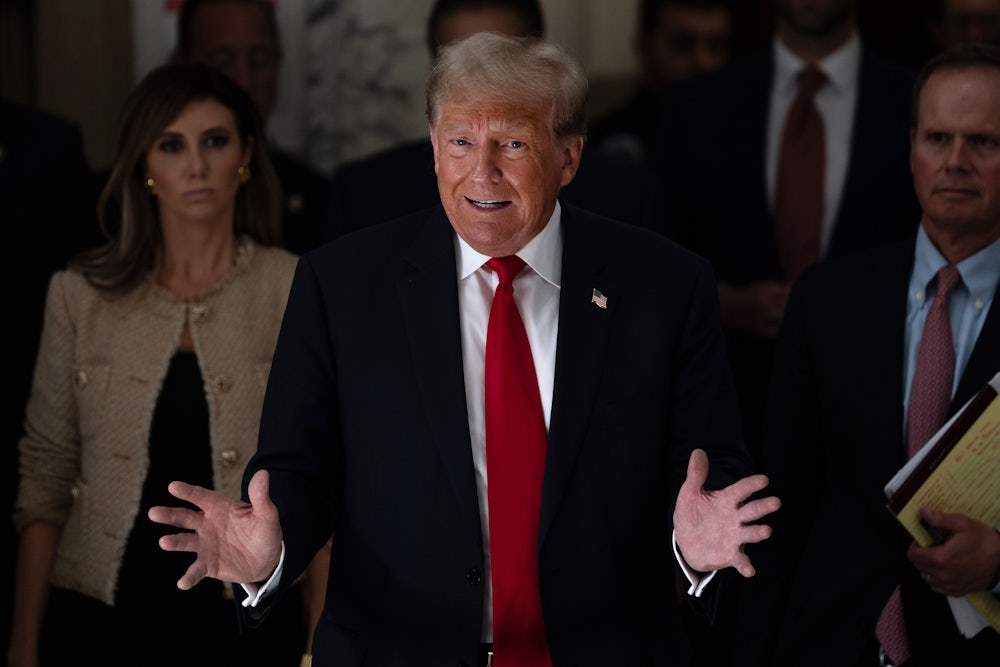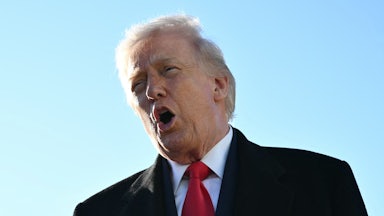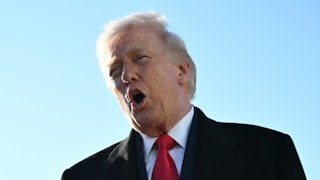If there’s one thing former President Donald Trump loves doing, it’s claiming that other people can’t hold him accountable. He argued for some form of presidential immunity while in office, often with little success. This week, he took it even further to argue that the Constitution had given him a get-out-of-jail-free card for his actions leading up to January 6, 2021.
Trump’s lawyers filed a motion to dismiss the charges in his federal trial in Washington, D.C., on Thursday, arguing that Trump enjoys “absolute immunity” as president for his alleged role in trying to overturn the 2020 election results. They claimed Trump’s comments and actions were actually part of his official duties as president and that therefore he couldn’t be held accountable for them.
“As the Constitution, the Supreme Court, and hundreds of years of history and tradition all make clear, the president’s motivations are not for the prosecution or this court to decide,” Trump’s lawyers wrote in their motion to dismiss. “Rather, where, as here, the president’s actions are within the ambit of his office, he is absolutely immune from prosecution.”
This is a profoundly flawed argument, but it’s worth enumerating the many ways in which it is so flawed. To make this claim, Trump’s lawyers not only had to misread the Constitution, the Federalist Papers, and the contemporaneous debates about ratification—they also had to misrepresent a conservative Supreme Court justice’s own arguments along the way. This does not bode well for its success.
Let’s get a few things out of the way right off the bat. The Constitution does not say that presidents are immune from criminal charges in any way, shape, or form. There is also no reason to think that presidential immunity was a basic assumption by the Founders that was so obvious they didn’t need to write it down.
To the contrary, the Framers specified two instances in which government officials could be immune from the criminal justice process. Article I says that members of Congress are “privileged from arrest during their attendance at the session of their respective houses, and in going to and returning from the same,” except in cases of “treason, felony, and breach of the peace.” In other words, traffic cops can’t lawfully stop lawmakers from reaching the Capitol for a vote by giving them spurious speeding tickets.
That same provision goes on to say that members of Congress “shall not be questioned in any other place” for “any speech or debate in either house.” Courts have construed this to broadly mean that prosecutors can’t charge lawmakers for anything they say on the floor of the House or the Senate, as well as in other purely legislative contexts. Alaska Senator Mike Gravel famously used this provision to read the Pentagon Papers into the Congressional Record in 1971, and South Carolina Senator Lindsey Graham invoked it to avoid some questioning by local prosecutors in a Trump-related case in Georgia.
Simply as a matter of logic, it would not make sense for the Framers to explicitly protect members of Congress in Article I and only implicitly protect the president in Article II. The more reasonable conclusion is that presidents enjoy no special immunity from criminal proceedings. This reading aligns with the fact that the Constitution lays out special treatment for presidents in other contexts: When one is impeached, for example, Article I says that his Senate trial is presided over by the chief justice of the United States, not by a senator as in other cases.
Undeterred, Trump’s lawyers tried to make the case for presidential immunity by misreading the Constitution’s language on impeachment. The Constitution describes Congress’s power of impeachment in brief terms: “Judgment in cases of impeachment shall not extend further than to removal from office, and disqualification to hold and enjoy any office of honor, trust or profit under the United States, but the party convicted shall nevertheless be liable and subject to indictment, trial, judgment and punishment, according to law.”
The first half of that clause limits the Senate’s power to punish an impeached official when it convicts them. In the English and British parliaments, the House of Lords could impose any criminal punishment that the law allowed when it convicted someone who had been impeached by the House of Commons. The Framers sought to narrow that power by only allowing removal from office and disqualification from future office. The second half of the clause says that whoever the Senate convicts can still face criminal proceedings, meaning that the common-law rule of double jeopardy does not apply to Senate trials.
Trump’s lawyers contort the second half of the clause beyond recognition to argue for Trump’s immunity. They argue it means a public official can’t face criminal proceedings if the Senate has acquitted them. “Because the Constitution specifies that only ‘the party convicted’ by trial in the Senate may be ‘liable and subject to indictment, trial, judgment and punishment,’ it presupposes that a president who is not convicted may not be subject to criminal prosecution,” the lawyers argued.
The Constitution does no such thing. The Senate’s conviction is not a prerequisite for a criminal indictment against a former president, or anyone else for that matter. The “only” that they apply to the original text is found nowhere in it. And the clause, read in its full context, is about the punishments that can be handed down through the impeachment process. British impeachments could result in imprisonment or worse for the person facing them; the Constitution makes clear that only the criminal justice process, not the Senate, can levy those punishments.
Trump’s lawyers tried to cite a few things to support their mistaken reading, none of which is remotely convincing. When they cite the Federalist Papers and the contemporaneous debates surrounding the Constitution, they are merely quoting the Framers restating the Constitution’s impeachment language in other ways and then applying their own misinterpretation to those paraphrasings. They have no evidence that anyone involved in drafting the Constitution thought that a president could only face criminal charges if the Senate first convicted him of them.
Their most egregious citation is to a dissenting opinion written by Justice Samuel Alito in Trump v. Vance in 2020. In that Supreme Court case, then-President Trump sought to block the Manhattan district attorney’s office from issuing a criminal grand jury subpoena to Mazars LLC, his personal accounting firm at the time. The court rejected Trump’s articulation of presidential immunity in that case in a 7–2 ruling.
“Two hundred years ago, a great jurist of our court established that no citizen, not even the president, is categorically above the common duty to produce evidence when called upon in a criminal proceeding,” Chief Justice John Roberts wrote for the court. “We reaffirm that principle today and hold that the president is neither absolutely immune from state criminal subpoenas seeking his private papers nor entitled to a heightened standard of need.”
Trump’s lawyers in this case quote part of Alito’s dissent in that case to buttress their claims about presidential immunity. “As Justice Alito recently noted, ‘[t]he plain implication’ of this Clause ‘is that criminal prosecution, like removal from the Presidency and disqualification from other offices, is a consequence that can come about only after the Senate’s judgment, not during or prior to the Senate trial,’” they said in their motion to dismiss on Thursday.
Alito made no such argument. If anything, he made the opposite point. The rest of Alito’s opinion dwells on what he saw as the constitutional perils of carrying out a criminal investigation of a sitting president in particular, not anyone who ever held the office. “The law applies equally to all persons, including a person who happens for a period of time to occupy the Presidency,” he wrote. “But there is no question that the nature of the office demands in some instances that the application of laws be adjusted at least until the person’s term in office ends.” To understand just how badly Trump’s lawyers butchered their “plain implication” quotation of Alito, read it in full.
The Constitution not only sets out the procedures for dealing with a President who is suspected of committing a serious offense; it also specifies the consequences of a judgment adverse to the President. After providing that the judgment cannot impose any punishment beyond removal from the Presidency and disqualification from holding any other federal office, the Constitution states that “the Party convicted shall nevertheless be liable and subject to Indictment, Trial, Judgment, and Punishment, according to Law.” The plain implication is that criminal prosecution, like removal from the Presidency and disqualification from other offices, is a consequence that can come about only after the Senate’s judgment, not during or prior to the Senate trial.
In other words, Alito was describing what he saw as the proper order of operations if a sitting president is accused of a crime. He read the clause to say that a sitting president could not face criminal proceedings unless the Senate first convicted him and removed him from office. That reading has no bearing on whether a former president can face criminal proceedings, and Alito made no argument of the sort. I am almost surprised that they even tried to claim otherwise. If this immunity “question” reaches the Supreme Court, are they just hoping Alito won’t notice that they misrepresented him to make it?
It’s worth noting that criminal proceedings against a sitting president are, indeed, an open constitutional question. The Supreme Court has never said whether a president can be indicted while in office, and it has studiously avoided suggesting an answer to that question whenever possible. Since Justice Department policy forbids it, a sitting president will likely never face federal charges under current law. In Vance, the Manhattan district attorney’s office said it would not charge Trump while he was in office, thereby allowing the justices to punt on that question.
But there is no reason to think that ex-presidents enjoy any sort of criminal immunity. No president before Trump has ever claimed anything of the sort. And while Trump is the first president to be indicted after leaving the White House, he isn’t the first one to have to worry about it: Richard Nixon came perilously close to facing charges for his role in the Watergate crisis after he resigned in 1974. But Gerald Ford’s pardon of Nixon removed that looming threat.
Ford acknowledged at the time that he acted not because Nixon couldn’t be indicted, but because he thought Nixon could be indicted and did not want it to happen. “After years of bitter controversy and divisive national debate,” Ford said in his statement announcing the pardon, “I have been advised, and I am compelled to conclude that many months and perhaps more years will have to pass before Richard Nixon could obtain a fair trial by jury in any jurisdiction of the United States under governing decisions of the Supreme Court.”
It was never in doubt that a court could try Nixon. Ford instead said that he feared that a lengthy trial and the prospect that Nixon could get off on a technicality would be counterproductive for the nation. Ford instead sought, for better or for worse, to ensure that the courts could not “prolong the bad dreams that continue to reopen a chapter that is closed.” Ford faced tremendous political blowback for pardoning Nixon, and the decision likely cost him the presidency when he ran for a full term in 1976.
That historical practice, coupled with the Constitution’s silence on Trump’s proposed “absolute presidential immunity,” should doom Trump’s arguments for it. He can’t quote any Supreme Court precedent to support it. The closest he can come is loose language in Nixon v. Fitzgerald, a case involving civil proceedings against a president, and a gross misreading of a justice’s dissenting opinion. If that’s the best they’ve got, then what they’ve got is nothing at all.










